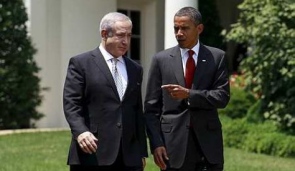Israeli Arab MK: Libyan aid ship won’t change course, headed for Gaza: Haaretz
Foreign Ministry announced earlier that organizers of Gaza-bound mission agreed to dock in Egypt rather than violate Gaza naval blockade.
A Libyan aid ship will head to Gaza’s port and will not be diverted, Palestinian Legislative Council member Jamal Al-Khudari and Israeli Arab MK Ahmed Tibi told the Palestinian news agency Ma’an on Saturday.
Al-Khudari, head of the Popular Committee Against the Siege, told Ma’an that he had been in constant contact with the organizers of the ship, who are expected to bring 2,000 tons of humanitarian aid to Gaza despite an Israeli naval blockade on the Hamas-ruled territory.
Earlier Saturday, Israel’s Foreign Ministry said that the Moldavian-flagged ship would not dock in Gaza, but would instead dock in Egypt’s el-Arish on the coast of the Sinai Peninsula.
According to the ministry, the change in destination was agreed to by the ship’s captain. It reportedly followed talks between Foreign Minister Avigdor Lieberman and his Greek and Moldavian counterparts.
A spokesman at the Greek Foreign Ministry said the ship would head for El Arish. An official from ACA Shipping, which owns the ship, told Reuters ahead of the ship’s departure that “the ship will leave in a few minutes for Gaza. If they don’t let us reach there [Gaza] we will head to El Arish harbor in Egypt.”
The ship – named the “Amalthia” – was set to depart Saturday from the Greek port of Lavrio with 12 crew and 15 activists and supporters on board, and about 2,000 tons of humanitarian aid supplied by the Gadhafi International Charity and Development Association, headed by Saif Al-Islam Gaddafi, the second-born son of the Libyan leader Muammar Gadhafi.
Tibi, of Israel’s Ra’am Ta’al party, confirmed that the ship had set sail and would arrive in Gaza some 40 hours after the departure. The Israeli Arab MK had told Israel Radio earlier that “sailing to Gaza is a political and humane act. I don’t know what Israel will do, because it has vowed to stop the ship, but Gaza remains the destination.”
“Sailing [the aid ship] is a form of passive resistance, which is preferable to any other form of resistance,” Tibi added.
Tibi had assisted the ship’s Libyan organizers, providing them with a list of items needed by residents of the Gaza Strip.
In an interview with Army Radio, Tibi confirmed a report in the Al-Quds Al-Arabi newspaper that the list included medicines, generators for hospitals and a type of children’s milk not available in Gaza.
On Friday, Israel launched a diplomatic move at the United Nations in efforts to enlist the international community to help prevent the Libyan aid ship from sailing to Gaza.
In an official letter to UN Secretary General Ban Ki-moon, Israeli ambassador to the UN Gabriela Shalev wrote that “Israel calls upon the international community to exert its influence on the government of Libya to demonstrate responsibility and prevent the ship from departing to the Gaza Strip.”
Shalev’s letter to Ban went on to clarify that “Israel reserves the right under international law to prevent this ship from violating the existing naval blockade on the Gaza Strip.”
Israel imposed the blockade on Gaza in 2007 following a bloody Hamas takeover of the Gaza Strip. Israel recently eased the terms of the land blockade on the territory, following a deadly raid of a Turkish aid ship, but the naval blockade has so far remained in place.
In the letter, Shalev further urged the international community “to discourage their nationals from taking part in such action,” adding that Israel “expects the international community to ensure that this ship does not sail.”
“The declared intentions of this mission are even more questionable and provocative given the recent measures taken by Israel to ensure the increase of humanitarian aid flowing into the Gaza Strip,” the letter went on to say, adding that Israel has taken upon itself the responsibility of ensuring the transfer of humanitarian aid into the Palestinian territory.
Copies of the letter were also submitted to the current president of the UN Security Council as well as the president of the General Assembly, a Libyan national who previously served as Libya’s foreign minister.
Gaza aid ship to dock in Egypt after Israel pressure: BBC
E-mail this to a friendPrintable version The Amalthea is carrying 2,000 tonnes of food, medicine and other items
A ship with supplies for Gaza will dock at el-Arish in Egypt, officials say, after Israeli pressure to stop the vessel breaking its Gaza blockade.
The Moldovan-flagged ship chartered by a charity run by the son of Libyan leader Col Muammar Gaddafi, left a Greek port on Saturday.
Israel asked for help from the UN, and had talks with Greece and Moldova. But organisers insist they will go to Gaza.
An Israeli raid on a Gaza-bound ship in May killed nine Turkish activists.
Israel insisted its troops were defending themselves but the raid sparked international condemnation.
Israel recently eased its blockade, allowing in almost all consumer goods but maintaining a “blacklist” of some items.
Israel says its blockade of the Palestinian territory is needed to prevent the supply of weapons to the Hamas militant group which controls Gaza.
Diplomatic drive
The Amalthea, renamed Hope for the mission, set off from the Greek port of Lavrio, loaded with about 2,000 tonnes of food, cooking oil, medicines and pre-fabricated houses.
It has been chartered by the Gaddafi International Charity and Development Foundation. Its chairman is Saif al-Islam Gaddafi.
The organisation said the 92m (302ft) vessel would also carry “a number of supporters who are keen on expressing solidarity with the Palestinian people”.
The BBC’s Malcolm Brabant in Lavrio says the Libyans clearly believe the time is right to test Israel’s resolve to maintain the naval blockade.
We are heading to Gaza for purely humanitarian reasons, we are not out to provoke anyone or to seek media attention
Youssef Sawwan
Director, Gaddafi International Charity and Development Foundation
Israel carried out intense diplomatic activity to prevent the Amalthea reaching Gaza.
A foreign ministry statement said that Foreign Minister Avigdor Lieberman had spoken with his Greek and Moldovan counterparts on the issue.
The statement said: “The foreign ministry believes that due to these talks, the ship will not reach Gaza.”
And Libya has now told the Greek government that the ship will now dock in Egypt’s el-Arish on the coast of the Sinai Peninsula.
“We confirmed their destination in talks with the Libyan ambassador and the ship’s agent,” foreign ministry spokesman Grigoris Delavekouras told Associated Press news agency.
Israel also lobbied the UN to take action.
Israel’s UN Ambassador Gabriela Shalev said in a letter: “Israel calls upon the international community to exert its influence on the government of Libya to demonstrate responsibility and prevent the ship from departing to the Gaza Strip.”
Ms Shalev also warned: “Israel reserves the right under international law to prevent this ship from violating the existing naval blockade on the Gaza Strip.”
She said the motives of the operators were “questionable and provocative”.
However, the director of the Libyan charity told the BBC the vessel was heading for Gaza.
“We have not cut deals with anyone,” Youssef Sawwan, told the BBC Arabic service.
“We are heading to Gaza for purely humanitarian reasons, we are not out to provoke anyone or to seek media attention,” Mr Sawwan said.
Report: Hezbollah on high alert over concern Israel ‘preparing something for us’: Haartez
Israel offered evidence of what it says is a growing threat from Hezbollah in southern Lebanon; Hezbollah says wants to avoid confrontation, Asharq al-Awsat reports.
Hezbollah warned on Saturday that Israel was preparing “something” in Lebanon and that the organization has been on high alert since Israel released aerial images to highlight the militant group’s activities close to the Israeli border earlier this week, the London-based Arabic language daily Asharq al-Awsat reported.
On Wednesday, Israel offered evidence of what it says is a growing threat from Hezbollah in southern Lebanon.
In a briefing to journalists, Israel Defense Forces Colonel Ronen Marley revealed previously classified photographs to show what he said was a unit of 90 Hezbollah militants operating in the village of Al-Hiyam, where they were storing weapons close to hospitals and schools.
The Hezbollah official told Asharq al-Awsat that they were concerned that Israel was “preparing something for us” and added that they would act with restraint.
“We want to avoid heated political debates because we want the summer season to be perfect for the Lebanese despite Israeli attempts to execute what it failed to achieve in 2006,” Asharq al-Awsat quoted the Hezbollah official.
“We are sensing suspicious international activity, especially after Israeli chief of staff Gabi Ashkenazi’s recent statements, all aimed at pressuring the Resistance,” the sources stressed.
Exposed: The truth about Israel’s land grab in the West Bank: The Independent
As President Barack Obama and Israeli Prime Minister Benjamin Netanyahu meet, a report reveals 42 per cent of territory is controlled by settlers
By Catrina Stewart in Jerusalem and David Usborne
Wednesday, 7 July 2010
Jewish settlers, who claim a divine right to the whole of Israel, now control more than 42 per cent of the occupied West Bank, representing a powerful obstacle to the creation of a Palestinian state, a new report has revealed.
The jurisdiction of some 200 settlements, illegal under international law, cover much more of the occupied Palestinian territory than previously thought. And a large section of the land has been seized from private Palestinian landowners in defiance even of an Israeli supreme court ruling, the report said, a finding which sits uncomfortably with Israeli claims that it builds only on state land.
Drawing on official Israeli military maps and population statistics, the leading Israeli human rights group, B’Tselem, compiled the new findings, which were released just as the Israeli prime minister, Benjamin Netanyahu, arrived in Washington to try to heal a gaping rift with US President Barack Obama over the issue of settlements.
“The settlement enterprise has been characterised, since its inception, by an instrumental, cynical, and even criminal approach to international law, local legislation, Israeli military orders, and Israeli law, which has enabled the continuous pilfering of land from Palestinians in the West Bank,” the report concluded.
Mr Obama’s demand for a freeze on illegal building has caused months of friction between his administration and the Israeli government. But the US president, facing mid-term elections in November, appeared eager to end the dispute with Israel yesterday.
He said the country was making “real progress” on improving conditions in the Gaza Strip and was serious about achieving peace.
The two men made a joint public appearance, carefully choreographed to convey mutual ease and friendship.
When Mr Netanyahu last visited the White House, in March, US anger at his refusal to end construction meant the Israeli premier was denied a joint appearance with Mr Obama before the cameras. This time the photo-op was granted and the two men afterwards shared a meal – although not a state dinner but a working lunch.
“Reports about the demise of the special US-Israel relationship aren’t premature, there are just flat wrong,” Mr Netanyahu said, in response to a reporter’s question about the perceived tensions. Playing to the same script, Mr Obama said that the “bond between the United States and Israel is unbreakable”.
But the revelations in the B’Tselem report suggest that despite Mr Netanyahu’s stated desire for peace, his policy on settlements remains a dangerous obstacle to the establishment of an independent Palestinian state and therefore to a durable peace.
They cast an uncompromising spotlight on Israeli practices in the Palestinian territories that have long drawn international criticism for establishing “facts on the ground” hampering the creation of a viable Palestinian state.
While most of the Jewish settlement activity is concentrated in 1 per cent of the West Bank, settler councils have in fact fenced off or earmarked massive tracts of land, comprising some 42 per cent of the West Bank, B’Tselem said.
And despite the outlawing by Israel of settlement expansion on private Palestinian land, settlers have seized 21 per cent of land that Israel recognises is privately-owned.
B’Tselem alleged that Israel had devised an extensive system of loopholes to requisition Palestinian land.
At the same time, Israel has built bypass roads, erected new checkpoints, and taken control of scarce water resources to the benefit of the settlers. The measures have effectively created Palestinian enclaves within the West Bank, the report said.
Under international law, any Jewish settlements built on occupied territory are illegal. These include all the settlements in the West Bank, and thousands of Jewish homes in East Jerusalem, the Arab-dominated sector of the city annexed by Israel after the 1967 Six Day War. The international community still regards East Jerusalem as occupied territory. Despite firm commitments from successive Israeli governments to dismantle illegal outposts built after 2001 and to cease expansion of the settlements, Israel has provided millions of dollars worth of incentives to encourage poorer families to move into the West Bank. Some 300,000 settlers live in the West Bank.
Settlers immediately attacked the report, claiming it was timed as a spoiler to the Washington meeting.
In Washington, no concrete breakthroughs were announced but Mr Obama said that he believed the Israeli leader was ready to move towards direct talks with the Palestinians. Indirect talks began earlier this year, mediated by special US envoy George Mitchell.
Mr Netanyahu showed signs of responding to the pressure. “Peace is the best option for all of us and I think we have a unique opportunity to do it,” he said. “If we work together with [Palestinian] President [Mahmoud] Abbas then we can bring a great message of hope to our peoples, to the region and to the world.”
The Palestinians continue to refuse direct talks with Israel while new settlement construction is allowed. Settlement activity continues in East Jerusalem, which Palestinians aim to include in a new state.
With US-Israel ties already frayed, Mr Netanyahu postponed a visit to the White House last month in the aftermath of Israel’s deadly raid on a Turkish-led flotilla trying to deliver humanitarian goods to Gaza.
For Mr Obama, the danger is clear that any long-lasting record of animosity towards Israel could translate into lost votes at the mid-term elections.






